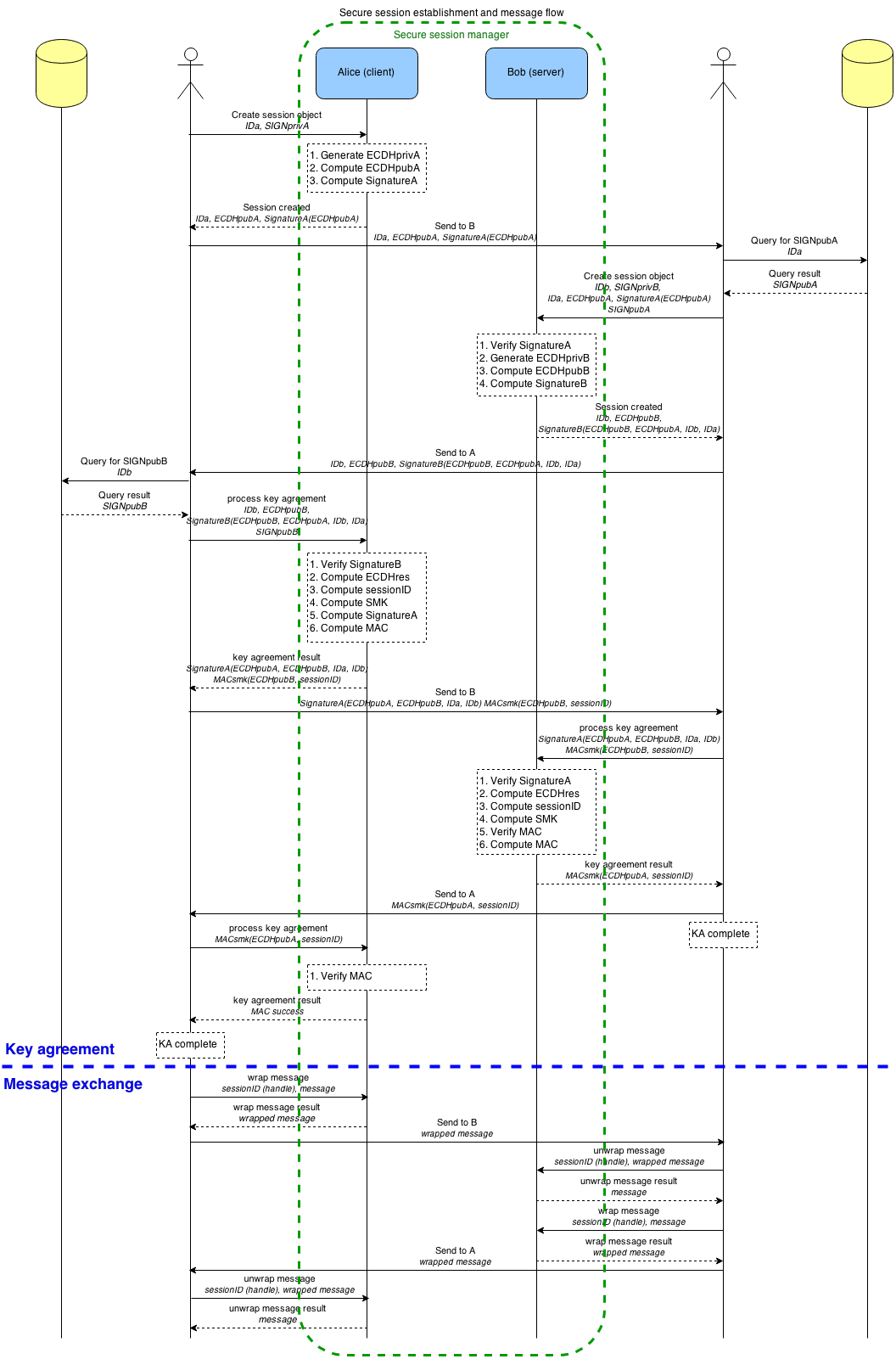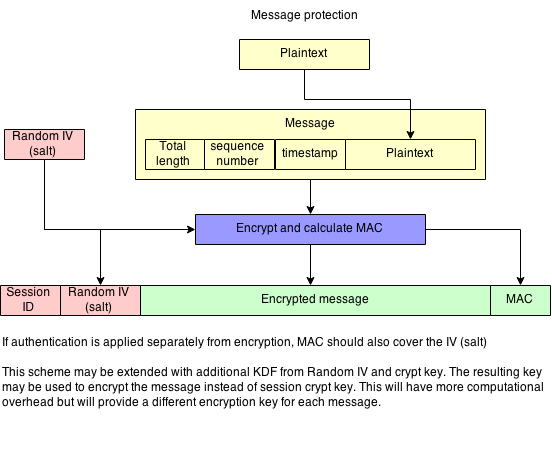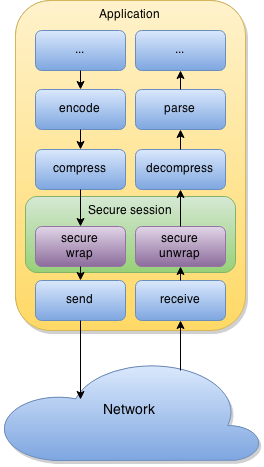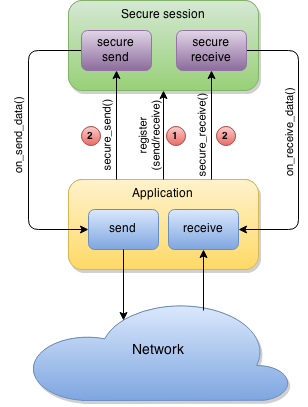Secure Session #
Secure Session is a lightweight mechanism for securing any kind of network communication (both private and public networks, including the Internet). It is protocol-agnostic and operates on the 5th layer of the network OSI model.
Some of the features of Secure Session are:
- secure end-to-end communication
- perfect forward secrecy
- strong mutual peer authentication
- replay protection
- low negotiation round-trip
- use of strong cryptography (including ECC)
- simplicity, user-friendliness
- ease of integration into existing applications
Note: You may also want to read this comment on comparing the design goals and usage of Secure Session and Secure Comparator with SRP.
Availability in Themis #
Secure Session is available in all languages supported by Themis, except React Native:
- C++
- Go
- JavaScript (WebAssembly)
- JavaScript (Node.js)
- Java
- Kotlin
- Objective-C
- Swift
- PHP
- Python
- Ruby
- Rust
Protocol description #
Communication over Secure Session consists of 2 stages:
- Negotiation (key agreement)
- Data exchange
Negotiation stage #
During the negotiation stage, peers exchange their cryptographic material and authenticate each other. After successful mutual authentication, each peer derives a session-shared secret and other auxiliary data from the session (session ID, initial vectors, etc.)
Note: Session ID is random and is derived from the negotiated cryptographic material by each peer independently. There is no way for a specific value to be enforced by any of the peers.

Data exchange stage #
During the data exchange stage, peers securely exchange data provided by higher layer protocols.
The session parameters (state) can be saved and restored at any time. This means that the lifetime of the Session can exceed the underlying environment’s power cycle.
Warning: Secure Session state contains sensitive information and should be stored and handled in a secure manner. For example, Secure Cell may be used.

Usage model #
Secure Session only provides security services and doesn’t do actual network communication. In fact, Secure Session is decoupled and independent from any networking implementation. It is your responsibility to provide an actual network transport for Secure Session to use.
There are two types of APIs available for easy integration and implementation: the buffer-aware API and the callback API.
Buffer-aware API #
This API is more flexible and useful for integrating Secure Session with an application that has its own sophisticated established network processing path. You only need to add some calls to Secure Session somewhere in this path. These calls will be operating with client-provided buffers directly.

Callback-oriented API #
Instead of integrating Secure Session into network processing path you can do the reverse: implement a set of simple callback methods and register them within the Secure Session framework. These callbacks are simple send/receive methods which will be called by Secure Session as necessary.

Mixed scenarios #
It is possible to mix buffer-aware and callback APIs together and use them simultaneously when your specific application requires it. For example, you can:
- use buffer-aware API to receive data, but use callback API to send it back
- use callback API in negotiation stage, but use buffer-aware API for data exchange
- switch from callback API to buffer-aware API and back again in the run-time based on some specific conditions
Implementation details #
Secure Session interface is described in
src/themis/secure_session.h.
Lifetime management #
New Secure Sessions are created by the secure_session_create() function
and has to be destroyed with secure_session_destroy():
secure_session_t* secure_session_create(
const void* peer_id,
size_t peer_id_length,
const void* private_key,
size_t private_key_length,
const secure_session_user_callbacks_t* user_callbacks);
themis_status_t secure_session_destroy(secure_session_t* ctx);
Peer IDs and keys #
Secure Session uses public-key cryptography for peer identification. Within a group of communicating Secure Sessions, every peer has at least one peer ID and a corresponding keypair associated with it.
Peer ID is an arbitrary non-empty byte array identifying a particular keypair. It is used by the transport callbacks to look up the corresponding public key. Peer ID is public information transmitted in plaintext during the negotiation stage. All Secure Session clients should know IDs of their peers.
There are no specific restrictions on peer ID content or length. You can use whatever is suitable for your application, for example:
- a static string:
"Client","Server" - hash sum of your public key:
74fa0f30262d... - GUID:
e3e7b306-c358-469a-a339-82671b651f78
The only requirement for peer ID is that it cannot be empty and it must uniquely identify the public key used by a peer.
Keypairs can be securely generated with Themis key generation functions. Secure Session only supports EC keys. RSA support is available per request only. Please contact us if you need to use RSA or other key types.
The API is described in
src/themis/secure_keygen.h:
themis_status_t themis_gen_ec_key_pair(
uint8_t* private_key,
size_t* private_key_length,
uint8_t* public_key,
size_t* public_key_length);
Note: Themis does not support importing pre-existing keys generated elsewhere. This makes it much harder to use weak keys, unknowingly or intentionally provided by third-parties.
The resulting private key must be kept secret by the peer. It is passed to Secure Session during construction. The public key should be known to the other communication peers, it will be requested during the key negotiation stage of Secure Session.
Please consult the key management guidelines to learn more about storing and exchanging keys securely after you have generated them.
Transport callbacks #
Secure Session requires a transport callback object for operation. The transport object is represented by the following structure:
struct secure_session_user_callbacks_type {
send_protocol_data_callback send_data;
receive_protocol_data_callback receive_data;
protocol_state_changed_callback state_changed;
get_public_key_for_id_callback get_public_key_for_id;
void* user_context;
};
The callback function signatures are:
typedef ssize_t (*send_protocol_data_callback)(
const uint8_t* data,
size_t data_length,
void* user_context);
typedef ssize_t (*receive_protocol_data_callback)(
uint8_t* data,
size_t data_length,
void* user_context);
typedef void (*protocol_state_changed_callback)(
int event,
void* user_context);
typedef int (*get_public_key_for_id_callback)(
const void* peer_id,
size_t peer_id_length,
void* public_key_out,
size_t public_key_out_length,
void* user_context);
The get_public_key_for_id_callback is the only required callback.
It is used to get the public key corresponding to a peer ID during the negotiation stage.
Without it Secure Session will have no means for authenticating the key exchange.
The send_protocol_data_callback and receive_protocol_data_callback
enable to callback API.
They are used to send and receive data over the communication channel.
These callbacks are called by the secure_session_send(), secure_session_receive(),
and secure_session_connect() functions
when they need to communicate.
If these callbacks are not set,
Secure Session can still be used in wrap/unwrap mode (see below).
The protocol_state_changed_callback is optional.
It delivers Secure Session state transitions to the client application.
You can not set it if you are not interested in state change notifications.
Wrap/Unwrap mode (buffer-aware API) #
In this mode data exchange callbacks are not used. You have to provide message buffers directly to Secure Session.
Initiate the connection with secure_session_generate_connect_request()
and send the message to the peer.
themis_status_t secure_session_generate_connect_request(
secure_session_t* ctx,
void* request_out,
size_t* request_out_length);
For each next message that you wish to send,
wrap it with secure_session_wrap() and send the result to your peer.
Each recieved message must be unwrapped with secure_session_unwrap().
themis_status_t secure_session_wrap(
secure_session_t* ctx,
const void* message,
size_t message_length,
void* wrapped_message,
size_t* wrapped_message_length);
themis_status_t secure_session_unwrap(
secure_session_t* ctx,
const void* wrapped_message,
size_t wrapped_message_length,
void* message,
size_t* message_length);
Send/Receive mode (callback API) #
In this mode Secure Session manages communication channel on its own using the data exchange callbacks provided by you.
Initiate the connection with secure_session_connect().
themis_status_t secure_session_connect(secure_session_t* session_ctx);
bool secure_session_is_established(const secure_session_t* session_ctx);
Secure Session will invoke send_protocol_data_callback and receive_protocol_data_callback
as necessary to negotiate the connection.
Once secure_session_is_established(),
you can use secure_session_send() and secure_session_receive()
to send and receive messages.
Again, Secure Session will invoke required callbacks with wrapped messages as necessary.
ssize_t secure_session_send(
secure_session_t *ctx,
const void* message,
size_t message_length);
ssize_t secure_session_receive(
secure_session_t* ctx,
void* message,
size_t message_length);
Thread safety #
Secure Session requires additional synchronisation to be used concurrently from multiple threads. Read more about Themis thread safety guarantees.